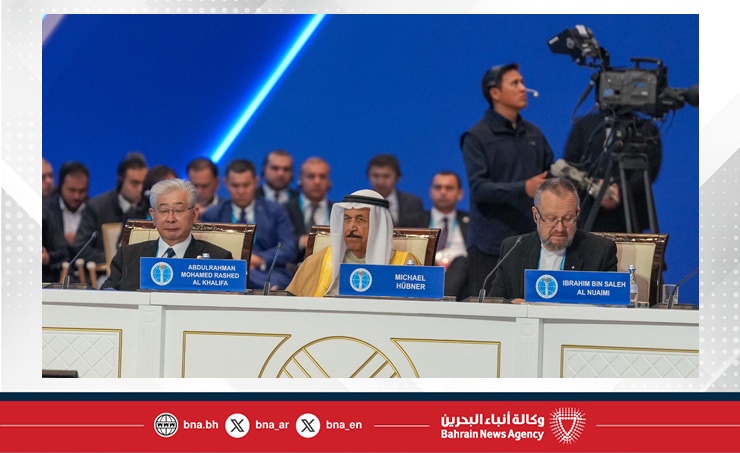SCIA Chairman participates in Eighth Conference of Leaders of World and Traditional Religions in Astana

Astana, Sep. 17 (BNA): Shaikh Abdulrahman bin Mohammed bin Rashid Al Khalifa, Chairman of the Supreme Council for Islamic Affairs (SCIA), participated in the opening of the Eighth Conference of Leaders of World and Traditional Religions, held in Kazakhstan. The conference brought together high-level delegations from more than 60 countries under the theme "Interfaith Dialogue Solidarity for the Future."
The two-day conference features prominent religious leaders from around the world and focuses on promoting the concept of "religious diplomacy" as an effective tool to address global challenges and seek solutions through ethical and spiritual leadership.
The conference was inaugurated by His Excellency Kassym-Jomart Tokayev, President of the Republic of Kazakhstan, who delivered a speech commending the Kingdom of Bahrain for hosting the Intra-Islamic Dialogue Conference held in February under the patronage of His Majesty King Hamad bin Isa Al Khalifa. HE President Tokayev highlighted the important outcomes of that event and stressed that such conferences are vital tools for promoting peace and constructive coexistence.
HE the President called for strengthening constructive dialogue and tolerance in response to rising global tensions, emphasising the role of religious leaders as "messengers of peace under the banner of humanity" and underscoring the importance of unity in the face of geopolitical, environmental, and technological challenges threatening humanity.
HE President Tokayev also warned against the rise of extremist nationalism and ideological conflicts, stressing the need for policies grounded in tolerance and mutual respect. He proposed establishing a "Peace Movement" under the conference’s auspices and launching initiatives to enhance international unity and address environmental and technological challenges.
The conference examines means to strengthen joint efforts to consolidate global peace through interfaith dialogue, addressing urgent humanitarian issues threatening humanity. It emphasises rejecting the use of religion to divide, justify killing, or incite violence, while promoting religion as a bridge for cooperation, a powerful force for peace, and reaffirming that the unified voice of religious leaders is stronger than that of weapons.
On its first day, the conference condemned all forms of violence, wars, and terrorism, discussed practical mechanisms to promote tolerance and counter hate speech, and issued a global appeal to stop the killing of civilians in Gaza and other conflict zones. It also called for joint initiatives by religious institutions to uphold justice, equality, and compassion, and to support refugees and victims of war.
Shaikh Abdulrahman bin Mohammed emphasised that the conference takes place at a time of mounting international challenges, including armed conflicts, humanitarian crises, religious and ideological extremism, hate speech, as well as shared global challenges such as hunger, poverty, racism, discrimination, and climate issues.
Shaikh Abdulrahman bin Mohammed added that human experience has shown that interfaith and intercultural dialogue is not a luxury or a secondary option, but a fundamental necessity for global stability, societal security, and national development. He stressed the need for broad support to transform such dialogues into effective partnerships that translate into practical initiatives, promote coexistence and peace, uphold human dignity, and achieve justice among nations.
Shaikh Abdulrahman bin Mohammed highlighted that Bahrain, under the leadership of His Majesty the King, has launched a series of global initiatives to promote coexistence and dialogue. These initiatives are guided by Bahrain’s vision that coexistence is a cornerstone of development, prosperity, strength, and stability, inspired by its historical legacy as a land of tolerance and diversity, where multiple religions, sects, and cultures have coexisted for centuries in an atmosphere of mutual respect.
Shaikh Abdulrahman bin Mohammed affirmed that Bahrain views the conference as a key partner in promoting shared values and that its recommendations can provide a practical framework for international cooperation in combating hatred, terrorism, and extremism while building a future based on justice and peace.





